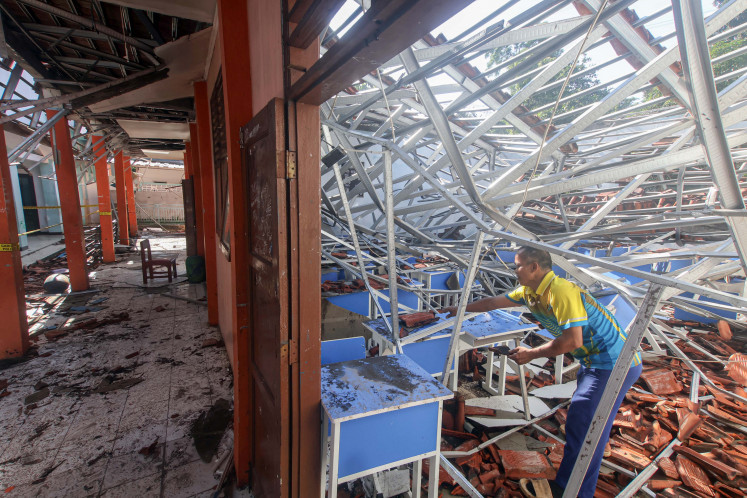Popular Reads
Top Results
Can't find what you're looking for?
View all search resultsPopular Reads
Top Results
Can't find what you're looking for?
View all search resultsWorkers greet new wages
Ongoing pressure to increase the minimum wage will be a disadvantage to everybody in the long run, employers say — while workers have greeted the new decisions on the new minimum wages, to be effective in the New Year
Change text size
Gift Premium Articles
to Anyone
O
ngoing pressure to increase the minimum wage will be a disadvantage to everybody in the long run, employers say — while workers have greeted the new decisions on the new minimum wages, to be effective in the New Year.
The Jakarta Post’s Ridwan Max Sijabat looks at the controversy in the following reports.
Workers in industrial estates in Riau Islands, West Java and Jakarta hailed the significant raises in wage as a starting point to live decently — like other people, workers said they can now save a little and have a bit of recreation.
Palace protest: Workers rally in front of the Presidential Palace. The strike on Nov. 21 was part of a series of rallies on labor welfare ahead of when the new minimum wage takes effect on New Year’s Day. JP/Ricky Yudhistira
Enny Chorifah, 19, who works at an electronic spare parts manufacturer in Muka Kuning industrial estate in Batam, said if her labor contract was extended she might be able to save, or to shop a little more, with the wage increase by 46 percent to Rp 2.04 million (US$220) from the current Rp 1.4 million.
“Unlike those living in rented bedrooms outside the industrial estates, we stay at the company’s dormitory, so I can go shopping at least once in two weeks for groceries or other things,” she told The Jakarta Post by telephone.
Enny, a senior high school graduate from Magelang, Central Java, has been employed for six months on a contractual basis, with monthly pay of Rp 1.4 million. She and her fellow workers get meals but do not receive any transportation allowance in compensation for the dormitory.
“With the wage going up to Rp 2.04 million from January and with overtime payments, I could earn around Rp 3 million per month and put aside around Rp 500,000, or send it to my parents in my village,” she said.
The Batam mayor has approved the increase in the minimum wage from the current Rp 1.4 million to Rp 2.04 million.
Winda Salmona, 20, a garment worker in Pulogadung industrial estate, East Jakarta, said she appreciated the first-ever significant increase from the current Rp 1.5 million to Rp 2.2 million 43 percent.
With an expected promotion to permanent status in December, thanks to the newly issued Ministerial Decree No. 19/2012 on outsourcing, as many as 300 contract-based workers in the garment factory will be promoted to permanent workers with a basic salary of Rp 2.2 million, she said. With transportation and meal allowances, “we can take home a total of Rp 3 million each month while workers will be registered with the Jamsostek social security programs,” she said.
Winda’s friend Danny Wirastati, a fellow high-school graduate from Indramayu, West Java, said with the real wage increase, they would be able to rent a larger room outside the industrial estate, purchase higher quality belongings, enjoy recreation centers at least once a month and save.
The two workers appreciated new Jakarta Governor Joko Widodo. “Despite the soaring price of basic commodities in the city, low-wage workers will survive and enjoy economic progress,” said Danny, secretary of the textile and garment unit of the Confederation of Indonesian Prosperous Labor Union (KSBSI) in the company.
Danny thanked the Jakarta administration, which considered not only basic prices, but also economic growth, companies’ financial capacity and the inflation rate to uphold social justice.
Manpower and Transmigration Minister Muhaimin Iskandar appreciated the decision made by regional heads to endorse the significant increases in provincial, regental and municipal minimum wages.
He said they would improve workers’ purchasing power and stimulate national economic growth through more consumption.
“We could no longer maintain the cheap labor policy, which in the end has created vulnerable groups with no access to good nutrition, better education, better health care and social justice. If the poor condition continues, we will be creating an uneducated, unhealthy and underdeveloped society,” he said, citing the higher minimum wage in neighboring Malaysia.
The minister said the minimum wages were the minimum salary level in regions allowed by the labor law for a single worker without any considerations of competence, job experience and productivity.
“The minimum wage is a social safety net for individuals to allow them to meet their basic needs, and to live as individual human beings,” the minister said. Employers paying below the minimum level were exploiting their workers, he said.










